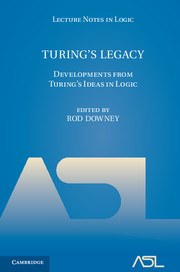Book contents
- Frontmatter
- Contents
- Turing's legacy: developments from Turing's ideas in logic
- Computability and analysis: the legacy of Alan Turing
- Alan Turing and the other theory of computation (expanded)
- Turing in Quantumland
- Computability theory, algorithmic randomness and Turing's anticipation
- Computable model theory
- Towards common-sense reasoning via conditional simulation: legacies of Turing in Artificial Intelligence
- Mathematics in the age of the Turing machine
- Turing and the development of computational complexity
- Turing machines to word problems
- Musings on Turing's Thesis
- Higher generalizations of the Turing Model
- Step by recursive step: Church's analysis of effective calculability
- Turing and the discovery of computability
- Transfinite machine models
- References
Towards common-sense reasoning via conditional simulation: legacies of Turing in Artificial Intelligence
Published online by Cambridge University Press: 05 June 2014
- Frontmatter
- Contents
- Turing's legacy: developments from Turing's ideas in logic
- Computability and analysis: the legacy of Alan Turing
- Alan Turing and the other theory of computation (expanded)
- Turing in Quantumland
- Computability theory, algorithmic randomness and Turing's anticipation
- Computable model theory
- Towards common-sense reasoning via conditional simulation: legacies of Turing in Artificial Intelligence
- Mathematics in the age of the Turing machine
- Turing and the development of computational complexity
- Turing machines to word problems
- Musings on Turing's Thesis
- Higher generalizations of the Turing Model
- Step by recursive step: Church's analysis of effective calculability
- Turing and the discovery of computability
- Transfinite machine models
- References
Summary
Abstract. The problem of replicating the flexibility of human common-sense reasoning has captured the imagination of computer scientists since the early days of Alan Turing's foundational work on computation and the philosophy of artificial intelligence. In the intervening years, the idea of cognition as computation has emerged as a fundamental tenet of Artificial Intelligence (AI) and cognitive science. But what kind of computation is cognition?
We describe a computational formalism centered around a probabilistic Turing machine called QUERY, which captures the operation of probabilistic conditioning via conditional simulation. Through several examples and analyses, we demonstrate how the QUERY abstraction can be used to cast common-sense reasoning as probabilistic inference in a statistical model of our observations and the uncertain structure of the world that generated that experience. This formulation is a recent synthesis of several research programs in AI and cognitive science, but it also represents a surprising convergence of several of Turing's pioneering insights in AI, the foundations of computation, and statistics.
§1. Introduction. In his landmark paper Computing Machinery and Intelligence [Tur50], Alan Turing predicted that by the end of the twentieth century, “general educated opinion will have altered so much that one will be able to speak of machines thinking without expecting to be contradicted.” Even if Turing has not yet been proven right, the idea of cognition as computation has emerged as a fundamental tenet of Artificial Intelligence (AI) and cognitive science. But what kind of computation—what kind of computer program—is cognition?
- Type
- Chapter
- Information
- Turing's LegacyDevelopments from Turing's Ideas in Logic, pp. 195 - 252Publisher: Cambridge University PressPrint publication year: 2014
References
- 3
- Cited by

